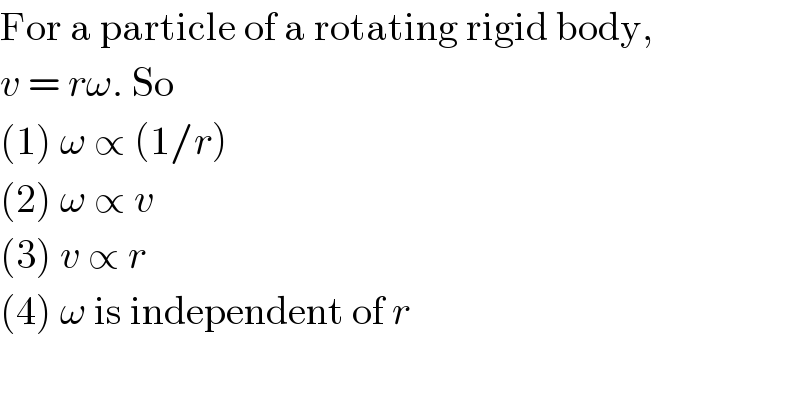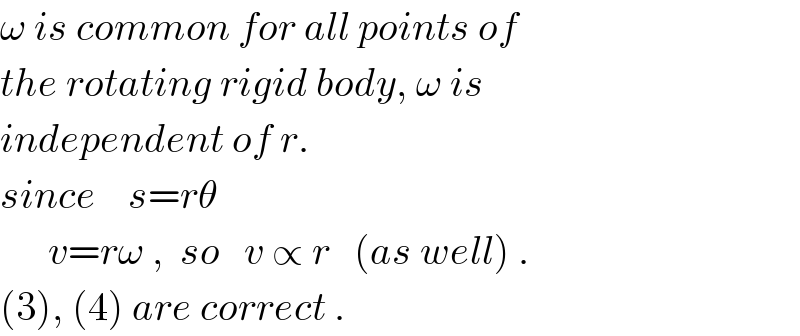Question Number 25038 by Tinkutara last updated on 02/Dec/17

$$\mathrm{For}\:\mathrm{a}\:\mathrm{particle}\:\mathrm{of}\:\mathrm{a}\:\mathrm{rotating}\:\mathrm{rigid}\:\mathrm{body}, \\ $$$${v}\:=\:{r}\omega.\:\mathrm{So} \\ $$$$\left(\mathrm{1}\right)\:\omega\:\propto\:\left(\mathrm{1}/{r}\right) \\ $$$$\left(\mathrm{2}\right)\:\omega\:\propto\:{v} \\ $$$$\left(\mathrm{3}\right)\:{v}\:\propto\:{r} \\ $$$$\left(\mathrm{4}\right)\:\omega\:\mathrm{is}\:\mathrm{independent}\:\mathrm{of}\:{r} \\ $$
Answered by ajfour last updated on 02/Dec/17

$$\omega\:{is}\:{common}\:{for}\:{all}\:{points}\:{of} \\ $$$${the}\:{rotating}\:{rigid}\:{body},\:\omega\:{is} \\ $$$${independent}\:{of}\:{r}.\: \\ $$$${since}\:\:\:\:{s}={r}\theta \\ $$$$\:\:\:\:\:\:{v}={r}\omega\:,\:\:{so}\:\:\:{v}\:\propto\:{r}\:\:\:\left({as}\:{well}\right)\:. \\ $$$$\left(\mathrm{3}\right),\:\left(\mathrm{4}\right)\:{are}\:{correct}\:. \\ $$
Commented by Tinkutara last updated on 02/Dec/17

$$\mathrm{But}\:\mathrm{why}\:\left(\mathrm{2}\right)\:\mathrm{is}\:\mathrm{wrong}? \\ $$
Commented by ajfour last updated on 02/Dec/17

$$\omega\:{is}\:{not}\:{a}\:{consequence}\:{of}\:{v}\:. \\ $$
Commented by Tinkutara last updated on 02/Dec/17

$${But}\:{since}\:{v}\propto\omega,\:{so}\:{why}\:{not}\:\omega\propto{v}? \\ $$
Commented by Tinkutara last updated on 02/Dec/17

$$\mathrm{But}\:\mathrm{answer}\:\mathrm{in}\:\mathrm{book}\:\mathrm{is}\:\mathrm{only}\:\left(\mathrm{3}\right)\:\mathrm{and}\:\left(\mathrm{4}\right). \\ $$
Commented by Tinkutara last updated on 02/Dec/17

$$\mathrm{I}\:\mathrm{want}\:\mathrm{to}\:\mathrm{know}\:\mathrm{why}\:\left(\mathrm{2}\right)\:\mathrm{is}\:\mathrm{wrong}. \\ $$
